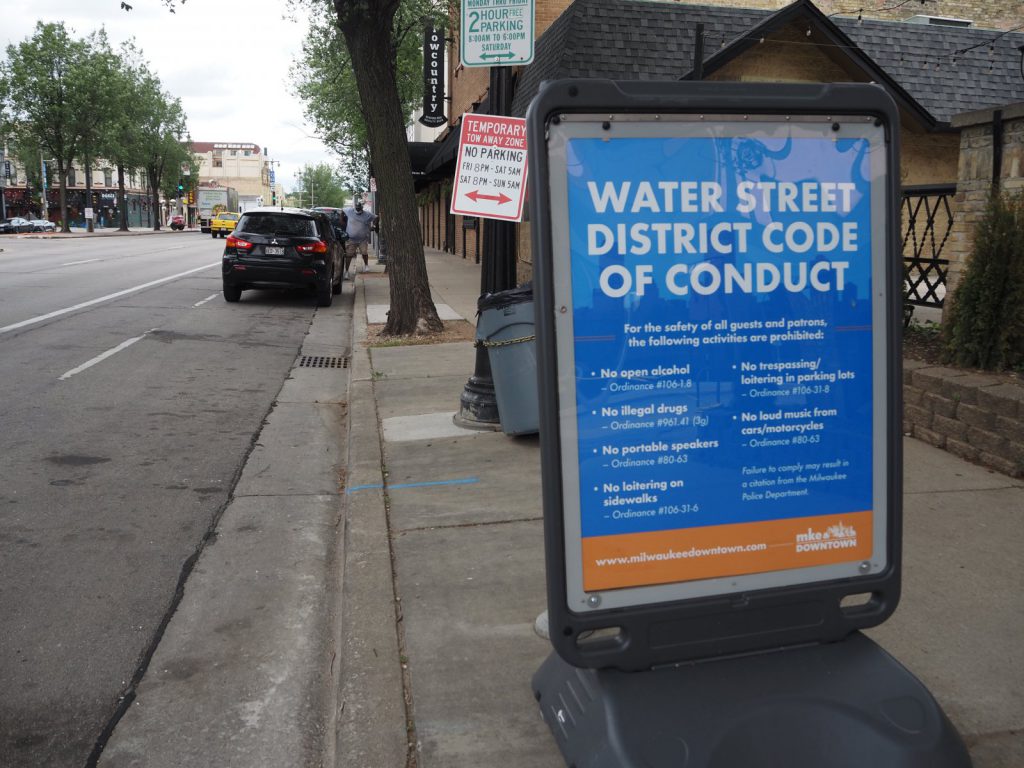Should Water Street Be Gun-Free District?
Downtown stakeholders consider how Kansas City, Memphis, New Orleans handle bar district problems.
Should the Water Street and Old World Third Street bar districts become a secured, controlled-access area every weekend night?
It’s one of many options on the table.
Late-night safety issues came to the forefront earlier this summer as pre-pandemic levels of patrons returned to many downtown bars. Another crowd began to form outside the bars. “We began to see issues of parties and cars, public nuisance issues, gun violence, fights and issues in general regarding public behavior,” said Milwaukee Downtown President Beth Weirick in introducing Peters during a virtual panel discussion Tuesday afternoon. At least six shootings took place in July, including one on the night the Milwaukee Bucks won the NBA championship.
Weirick said the goal is to “once again elevate the fabulous experience so many people have in our nighttime entertainment districts.”
Moderated by Peters, representatives of entertainment districts in Kansas City, Memphis and New Orleans shared various mitigation strategies they have implemented to control crowds and improve safety.
Kim Kimbrough, executive director of Kansas City’s Westport Regional Business League business improvement district, detailed how temporary barriers are erected around the Westport bar district each weekend. From 11 p.m. to 3 a.m. anyone seeking entry must be 21 or older and not be carrying a weapon. Individuals must go through a metal detector staffed by a private security firm and an off-duty law enforcement officer.
He said the changes were spurred by the Missouri Legislature making the state’s gun laws among the laxest in the country. “We started seeing literally [people with] AR-15s, AK47s walking up and down our streets at night,” said Kimbrough. “It really opened our eyes.”
Kimbrough said a surge in gun-related incidents was hurting both nighttime and daytime business, with the effects measurably felt for months after incidents. Now guns and other weapons are banned. “Weapon offenses are down 69%,” he said of the area.
By banning all carry-ins, including non-alcoholic beverages, and prohibiting people under 21 from being in the area after 11 p.m., there also has been a perceived improvement. “There is rarely a night that passes that we don’t turn away at least 60 [people] that can’t produce a valid ID that shows they are 21 or [have] a bad fake,” he said.
He said business owners were okay with paying more to the district to pay for the security costs. “It is money well worth it in terms of our gross receipts,” said Kimbrough.
Jon Shivers, director of the city-affiliated Beale Street Management in Memphis, also oversees a secured district. Shivers said his three-block district is secured every night with temporary fencing. But it comes with an unusual twist: all of the property, including the buildings leased to bars, are publicly owned. The operation is similar to the Kansas City model, but also includes a $5 security cover charge on particularly busy nights. Shivers said the fee was challenged in court, but his organization prevailed.
There is a distinction based on the size of the organization. Shivers noted that the Memphis Police Department must deal with issues related to food trucks and crowds just outside of the perimeter, particularly on nights when the cover charge is in effect.
An entirely different strategy is in place in New Orleans. Brittany Mulla McGovern, executive director of the French Quarter Business Association, shared how bollards are used to block vehicle traffic at peak times, but otherwise there are not metal detectors and a security perimeter. Nor does she expect to see such a perimeter in her lifetime.
“Nobody wants to wand somebody that is coming to stay at their hotel or eat at their restaurant,” said Mulla McGovern of the challenges with the many different uses in the French Quarter.
The area does allow public consumption of alcoholic beverages, similar to Memphis. But she said that creates its owns challenges. The public works department must routinely clear out drains because they are filled with to-go cups. Enforcement also becomes an issue because once people are in the street the bars are no longer responsible for behavior.
Milwaukee Police Department Captain James Campbell, who oversees Downtown, asked a number of questions including how permitting works, if law enforcement officers are needed for security and what types of barriers are used. “We obviously have had our challenges this year,” he said.
None of the security perimeters require regular permitting, but some rely on legal loopholes. The sidewalks in Kansas City were transferred to private ownership to allow them to be closed.
Drew Deuster of Wild Planet Hospitality Group, which owns a number of downtown bars, also asked questions of the panelists. Deuster is one 11 stakeholders tasked with working on the Milwaukee effort. Representatives, slotted into different categories, including hospitality, safety, development, culture, community and research, include VISIT Milwaukee CEO Peggy Williams-Smith, Deuster, MPD lieutenant Timothy Gauerke, MPD chief of staff Nick DeSiato, Public Works Commissioner Jeff Polenske, Marcus Corp. corporate real estate vice president Katie Falvey, United Performing Arts Fund CEO Patrick Rath, Pabst Theater Group president Gary Witt, Westown Association executive director Stacie Callies, assistant district attorney Kelly Hedge and Milwaukee Downtown economic development director Matt Dorner.
A final report from RHI is expected to be delivered by October 8.























How can Milwaukee Downtown President Beth Weirick not include the residents of the area in the discussion ? The L’Hermitage Condominium Association has 48 residential units and a value of $30M for the property. Yet we are not invited to the table. Until the residents concerns are equally addressed, then this effort is wasted.